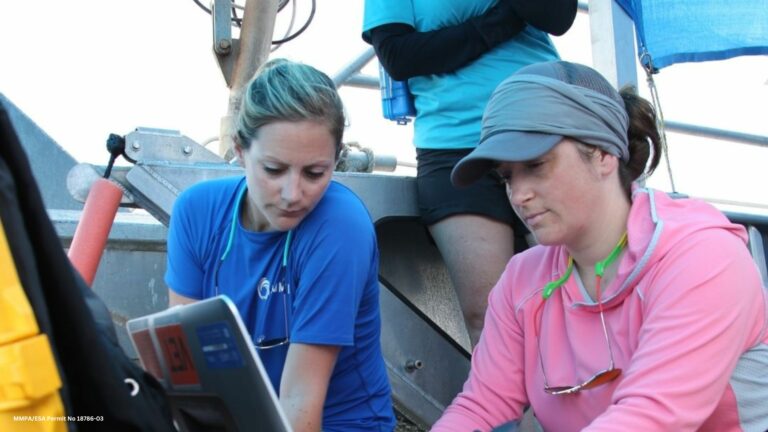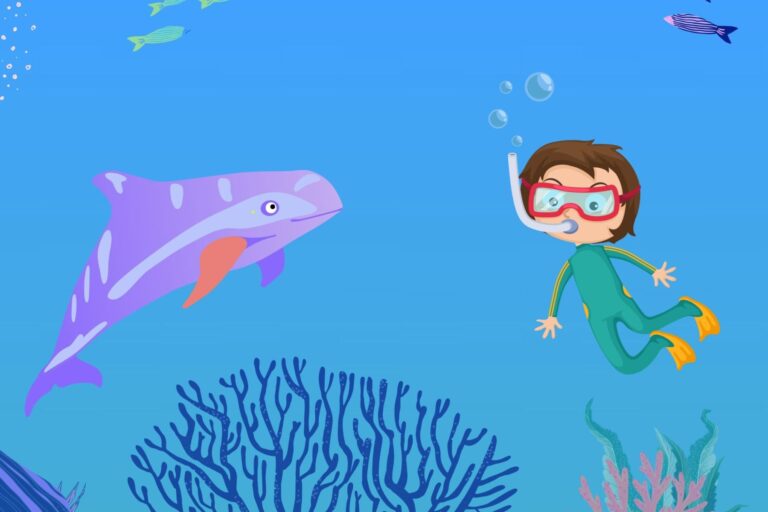FOR IMMEDIATE RELEASE
Contact: Kristina Martz, ex******************@**mf.org
Bita’s Journey: A Stranded Franciscana Dolphin in Uruguay, One of the World’s Most Endangered Dolphin Species, Embarks on a Path to Recovery at CRAM-FURG, Brazil
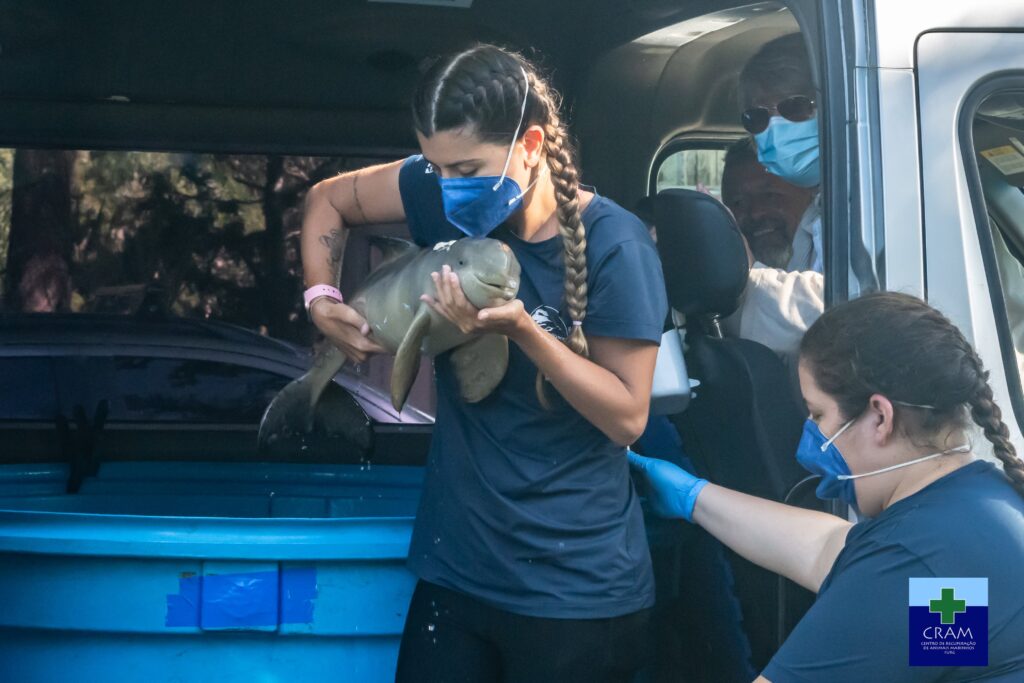
Dr. Duarte Benvenuto gently cradles Bita in her arms after the dolphin’s arrival at CRAM-FURG. © all AFCR3
Rio Grande, Brazil – The critically endangered Franciscana dolphin (Pontoporia blainvillei) is one of the world’s most threatened small cetaceans, making every rescue a vital step toward securing the future of the species. On November 9, 2024, a neonate female Franciscana dolphin was found stranded on La Coronilla beach, Uruguay. Just a few days old and in critical condition, she was named Bita and has since become a symbol of resilience and conservation success.
Bita received her initial treatment at Karumbé, a renowned rehabilitation center in Uruguay, particularly known for its work with sea turtles. From the outset, the Alliance for Franciscana Dolphin Conservation Research, Rescue, and Rehabilitation (AFCR3) coordinated the comprehensive rehabilitation process, bringing together leading experts, veterinarians, and volunteers from across South America. The efforts were further supported by Yaqu Pacha – Uruguay and RENACE, whose expertise and dedication played a crucial role in ensuring Bita received the critical care she needed during these early stages of her recovery.
Expert-Led Care and International Collaboration
Dr. Aricia Duarte Benvenuto (University of São Paulo, Brazil) and a consulting veterinary group from the National Marine Mammal Foundation (NMMF), led by Dr. Jenny Meegan, led Bita’s rehabilitation efforts. Nearly 20 dedicated volunteers, primarily from Uruguay but also from Brazil and Argentina, supported the veterinarians in providing round-the-clock care.
After weeks of intensive support, Bita was transported to CRAM-FURG, a rehabilitation center in Rio Grande, Brazil, renowned for its expertise in marine mammal rehabilitation. The seven-hour journey was carried out with meticulous planning, ensuring Bita’s safety and comfort. Traveling in a specially designed pool with water, Bita remained calm throughout the transport, thanks to the careful handling of the team.
The Alliance for Franciscana Dolphin Conservation brought in Dr. Kyle Ross, an experienced veterinarian specializing in dolphin transport, from the National Marine Mammal Foundation (NMMF). With the generous support of NMMF and Dolphin Quest, Dr. Ross worked alongside Dr. Benvenuto to oversee Bita’s wellbeing during the journey. Throughout the transport, Dr. Jenny Meegan from the USA remained in continuous contact with Dr. Duarte Benvenuto and Dr. Ross, with all three leading and coordinating the entire process to ensure Bita’s safety and care.
Specialized Care for a Delicate Dolphin
Bita’s rehabilitation requires highly specialized and continuous care, as neonate dolphins are extremely fragile. She receives hourly feedings of a customized dolphin Zoologic milk formula, administered through both tube feeding and via bottle and nipple. This ensures she gets the necessary nutrients for her growth and recovery. Additionally, she is closely monitored 24/7 by the veterinary team and volunteers to track her hydration, behavior, and overall health. This dedicated attention is crucial to giving Bita the best chance at survival and recovery.
A Tremendous Learning Experience
As NMMF’s lead consulting veterinarian, Dr. Jenny Meegan shared her reflections on Bita´s journey: “I have been here from the beginning, when we started developing the protocols for rehabilitating neonate Franciscana dolphins. Since then, many trials of rehabilitation have been undertaken, and it is incredibly rewarding to see that our efforts were not in vain. Bita is a perfect example of why we need to analyze each case step-by-step in order to refine our procedures and improve our chances of success. Every case teaches us something new, helping us pave the way for better outcomes in the future. It has been amazing getting to know and learn from Bita. She is so strong and resilient and we are so grateful to her for this experience”
Reflecting on the process, Dr. Aricia Duarte Benvenuto remarked: “It has been a tremendous experience to spend 24 hours a day with Bita, providing her the care she needs. Each step of her rehabilitation has not only been rewarding but also an invaluable learning opportunity for the future. The knowledge gained from her care will greatly enhance our ability to help other stranded dolphins and improve conservation efforts for this critically endangered species.”
A New Chapter at CRAM-FURG
Now safely at her new home at CRAM-FURG, Bita will continue to receive 24/7 care from a dedicated team of veterinarians and volunteers. This marks a significant milestone in her recovery journey, which has been made possible through the collaboration of multiple organizations.
NMMF Conservation Medicine Veterinarian, Dr. Ashley Barratclough reflected: “Bita’s breakthrough is the result of countries collaborating in conservation. It’s a huge step forward in the conservation of the Francsicana species and really is the result of so many incredible individuals from many different countries working together”.
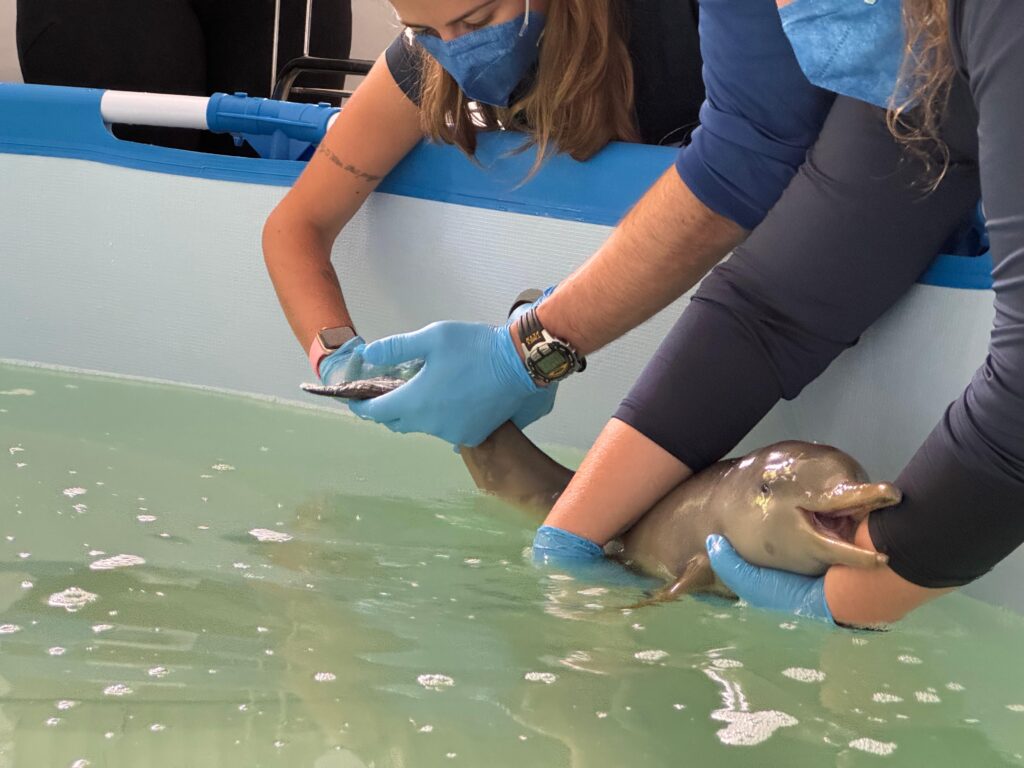
Veterinarians carefully draw a blood sample from Bita. © all AFCR3
The Alliance for Franciscana Dolphin Conservation, under the guidance of YAQU PACHA, Nuremberg Zoo, NMMF, and Dolphin Quest, has been instrumental in each phase of Bita’s rescue and rehabilitation. These organizations are now working together to design a long-term plan for her future, exploring options that will prioritize her wellbeing and contribute to broader efforts to conserve the Franciscana dolphin species.
Dr. Lauro Barcelos, Director of CRAM-FURG, expressed his thoughts on Bita’s rehabilitation: “We are honored to be part of the Alliance for Franciscana Dolphin Conservation Research, Rescue and Rehabilitation and to take on the next chapter in Bita’s recovery. The exceptional work started by Karumbé has laid the groundwork for her care, and we are fully committed to continuing this great effort here at CRAM-FURG. It is a privilege to contribute to the conservation of the Franciscana.”
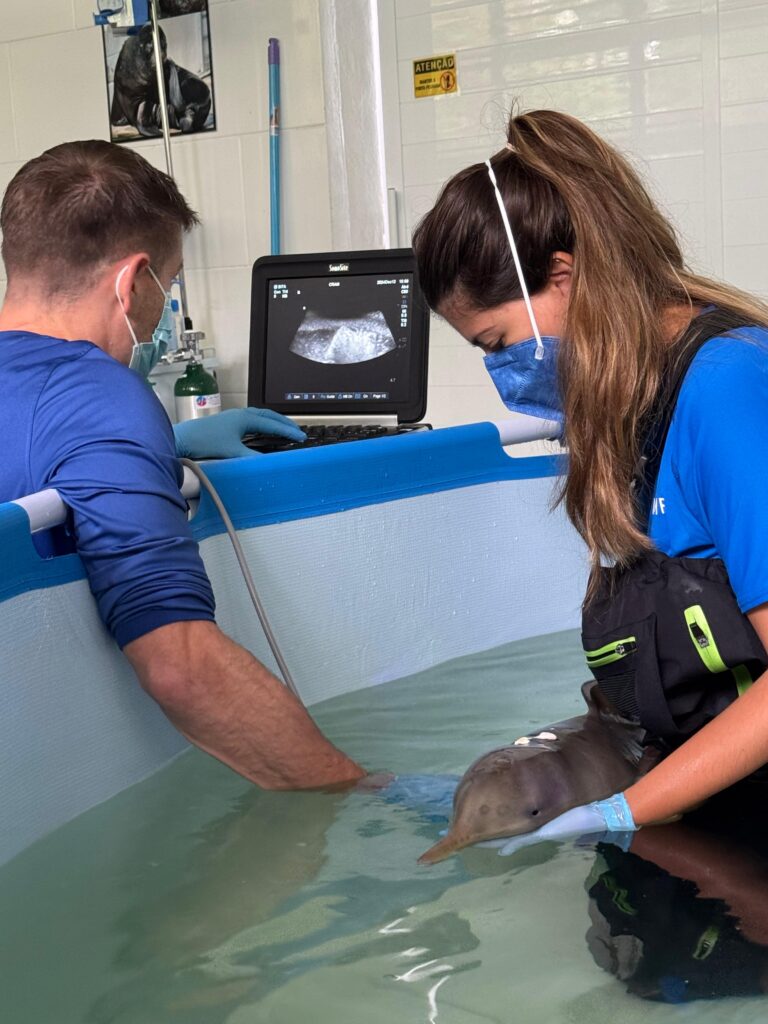
Dr. Ross and Dr. Duarte Benvenuto carefully perform an ultrasound on Bita. © all AFCR3
A Collaborative Achievement
Speaking on behalf of the entire Alliance, Dr. Lorenzo von Fersen (YAQU PACHA and Nuremberg Zoo) emphasized the significance of Bita’s journey: “This is a unique moment for the Alliance, and it demonstrates that perseverance, scientifically sound approaches, and most importantly, the cooperation between our members and their immense dedication are the keys to success. We are deeply thankful for the great enthusiasm and willingness to help shown by everyone involved. Bita’s case proves that together, we can achieve extraordinary outcomes for the conservation of this critically endangered species.”
Dr. Forrest Gomez, NMMF’s Director of Conservation Medicine and Operation GRACE, emphasized the urgency of the moment, stating, “As we face the sixth mass extinction, with species vanishing at unprecedented rates, the survival of Bita symbolizes the power of collective hope and action. This success underscores the critical importance of protecting Franciscana dolphins and all at-risk cetaceans worldwide, reminding us that saving even the most vulnerable species is still within our reach.’”
Contact Information
For media inquiries and further information, please contact:
- USA: Kristina Martz, ex******************@**mf.org
- Europe: Dr. Lorenzo von Fersen, lo*****@*******en.org
- Uruguay: Paula Laporta, pa***********@***il.com
- Brazil: Dr. Aricia Duarte Benvenuto, ar**************@***il.com
Dr. Paula Canabarro, pa**************@*****il.com
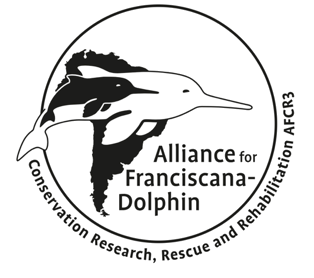
About the Alliance (AFCR3)
The Alliance for Franciscana-Dolphin Conservation Research, Rescue and Rehabilitation (AFCR3) was established in 2019 in response to the high number of live stranded animals, primarily neonates, requiring urgent care. Its mission is to aid live strandings, provide essential equipment and expertise, and support conservation professionals through training programs. The founding members, YAQU PACHA, Nuremberg Zoo, the NATIONAL MARINE MAMMAL FOUNDATION and DOLPHIN QUEST, coordinate the Alliance’s activities with several other institutions, driving forward its mission to protect the Franciscana dolphin, one of the most threatened dolphin species in South America. A cornerstone of the Alliance’s success is the dedication and expertise of numerous non-governmental organizations and universities from South America. Institutions such as Fundación Mundo Marino & Aquarium (Argentina), Karumbé, Yaqu Pacha-Uruguay, and RENACE (Uruguay), University of São Paulo, Biopesca, University of the State of Santa Catarina, Federal University of Paraná, CRAM/ ECOMEGA (both from the Federal University of Rio Grande-FURG), R3, Aiuká, Regional University of Joinville (UNIVILLE), Instituto Gremar, and Instituto Argonauta (all from Brazil) actively drive the mission forward through their fieldwork, research, and conservation initiatives. Their contributions are complemented by the vital support of European organizations like L’Oceanogràfic and ZOOMARINE – Algarve, whose involvement strengthens the Alliance’s capacity to address the complex challenges facing Franciscana dolphins and other small cetaceans. Together, this collaborative network forms the backbone of the Alliance’s impactful work.
The Alliance’s goals extend beyond emergency response and rehabilitation; it also focuses on developing long-term housing alternatives for rehabilitated animals that cannot be released and on investigating, preparing, and successfully releasing animals back into the wild whenever feasible. These efforts ensure that each animal receives the best possible care while contributing to the overall survival of the species in its natural habitat.
Saving stranded Franciscana dolphins is critical not only for the survival of this species but also for small cetaceans in general. Each rehabilitation is a valuable learning experience, providing critical insights into care protocols, health management, and behavioral assessments that can be applied to other small cetacean species. These efforts contribute to a broader understanding of conservation strategies and help refine techniques for future interventions.
The importance of the Alliance lies in its ability to unite a diverse and global coalition of experts, institutions, and resources to address the multifaceted challenges facing the critically endangered Franciscana dolphin. This collaboration not only ensures rapid response to emergencies but also fosters the development and dissemination of innovative conservation strategies. By bringing together expertise from marine biology, veterinary medicine, and community engagement, the Alliance highlights the critical role of international cooperation in securing a sustainable future for this species and small cetaceans worldwide.
